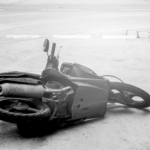Sneezing: A Defence Against Driving Charges?

Negligent, reckless and dangerous driving charges often follow collisions where a person is seriously hurt.
As discussed in a previous blog, drivers must be acting voluntarily to be found guilty of driving offences.
Being asleep, acting under duress (under threat), or automatism (involuntarily) are all possible defences to driving charges: but what about a violent sneezing attack?
While your eyes won’t pop out if you sneeze too hard, we are all aware that sneezing can come out of nowhere, and forces us to close our eyes and lose focus.
A sneezing fit can last several few seconds – which may be all it takes to cause a car crash. Whether this may amount to a complete defence was examined in the case of Ahadizad and Emerton (2002).
Ahadizad v Emerton
It was Canberra, 1999, and Toorage Ahadizad was driving his car passed a block of shops when he felt an irritation. Although he had a tickle, he didn’t know it would lead to a fit of violent sneezing.
A few moments later, he did indeed suffer a sneezing attack for over 100 metres, with his eyes shut the majority of the time.
By the time the attack subsided, Mr Ahadizad found himself on the wrong side of the road. He managed to gain control but it was too late – he tragically collided with an oncoming car whose driver had impulsively switched lanes in an attempt to avoid the collision.
Mr Ahazidad was charged with “driving in a manner dangerous” and was found guilty. He then appealed the case to the Supreme Court of the ACT.
Unfortunately for Ahazidad, the Supreme Court agreed with the Magistrate, refusing the appeal and confirming the conviction.
The Court’s reasoning was that sneezing did not totally incapacitate Mr Ahazidad; rather, he still had a “modicum of control.” It found that Ahazidad was capable of taking steps to counteract the danger, including applying the brakes, which he failed to do.
However, the decision left room for drivers to rely on the defence if they did take reasonable steps to counteract the danger.
UK Sneezer Succeeds
In the UK, Sargeant Maj Harry Gurung’s case went the other way. The 45-year-old was driving home and sneezed several times while attempting to overtake another car. He tragically collided with an oncoming vehicle, killing both occupants.
During his trial, Mr Gurung called the director of Britain’s Common Cold Centre, Professor Ronald Eccles, to testify in court. The Professor gave evidence that:
“a typical sneeze lasts for up to three seconds and both eyes always close during a sneeze… If Mr Gurung sneezed four times he would have been distracted by it for up to 12 seconds.”
The testimony was crucial in securing an acquittal for Mr Gurung, with the court finding that he could not reasonably have taken steps to avoid the particular collision.
What Does this Mean?
Although in different jurisdictions, the judges in both cases expressed the view that a person who is partially incapacitated – through sneezing or otherwise – can only escape liability if they take steps that are reasonably available to them to avoid a collision.
In the words of the ACT Supreme Court:
“the sneezing attack is not absolute. Even during rapid and severe sneezing one still has a modicum of control. In the present case the degree of sneezing was such that it was open to the Magistrate that the appellant could and should have applied the footbrake.”
If you have been charged with a driving offence and are unsure about how to proceed, an experienced criminal lawyer can advise you of your options and the best way forward.
Going to court for a traffic offence?
If you are going to court for a traffic offence, call or email Sydney Criminal Lawyers anytime to arrange a free first consultation with an experienced, specialist traffic lawyer who will accurately advise you of your options, the best way forward, and fight for the optimal outcome in your specific situation.






